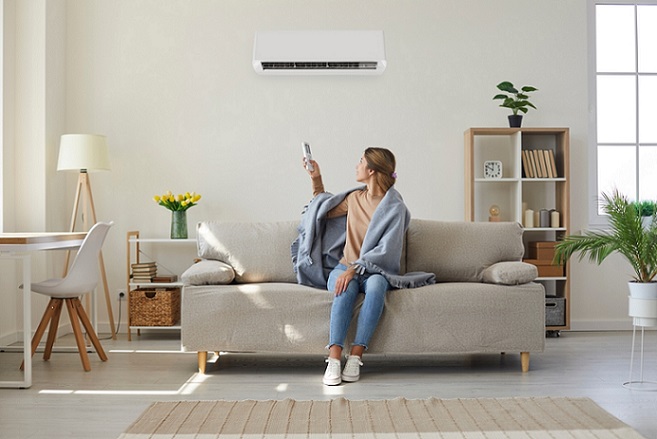
In the scorching heat of summer and the heatwave which break the spirit of even most fans of the summer season, air conditioning seems like a blessing.
Air conditioning provides a more comfortable environment and improves work performance as it allows a cool environment to work with optimal efficiency. It is also said that air conditioning induces better sleep and therefore, more productivity and liveliness during the day, all because of its ability to reduce the normal room temperature. Furthermore, it reduces the risk of heat stroke and dehydration as it reduces perspiration and overall humidity. It is often suggested that the use of air conditioners reduces the possibility of asthma attacks as it filters the air and eliminates most contaminants like pollen and indoor allergens.
While all of these factors pose air conditioners as incredibly useful appliances, it might seem surprising to most people that they actually might have a detrimental effect on the human body.
Some harmful effects of air conditioning are:
1. Headaches:
Headaches due to the excessively cold environment created by the air conditioners is very common. As air conditioners release volatile chemicals, sometimes when ACs are used in an enclosed space for too long, these chemicals can get accumulated which can lead to such headaches among other problems. These chemicals can also lead to chemical sensitivity due to which people can experience sore throat, nausea and other symptoms of cold.
2. Skin problems:
Excessive use of air conditioners also leads to depletion of the skin’s natural moisture balance over time. As this natural balance is disrupted, enough oils are not released from the glands in the skin. Consequently, the skin becomes dry and even starts to appear textured. Over an extended period of time, skin aging process speeds up by double the normal rate due to lack of hydration. Fine lines are also very common as a result of the same.
3. Laziness:
Continued exposure to an environment that is constantly being air-conditioned also contributes to lethargy. The normal body temperature of humans is 37℃. Due to the very low temperatures of the surroundings, after a period of exposure, the body starts reacting. Response often becomes slower and signs of sluggishness are fairly observable. Cognitive processing also slows down slightly due to extremely low temperatures.
4. Reduced heat tolerance:
The human body gets acclimated to the fairly low temperature after prolonged exposure.
Consequently, getting out of such an environment and facing average temperatures becomes challenging for most people, thereby reducing heat tolerance in general. Outdoor sensitivity also decreases and the overall strength of the body to cope with heat slowly falls.
5. Dry eyes:
Another very prevalent effect of air conditioning is dry eyes. Air conditioners reduce atmospheric humidity which leads to drying up of the tear film of eyes. Due to the reduction of temperature, the glands in the eyes do not function properly. As a result, oils are not secreted in appropriate amounts which leads to dry eyes. Furthermore, the ducts of ACs might act as a source of bacteria and viruses which can cause harm to the eyes.
Using eye drops and other effective products to keep your eyes hydrated can prevent dry eyes.
6. More risk of infection:
Air conditioning can make the indoor air excessively dry. This dry air results in drying up of the mucus leading to irritation of the mucous membrane. Mucus is responsible for acting as a primary barrier against infection by trapping most allergens. Due to the mucus barrier being compromised, the body becomes more prone to being affected by pathogens and allergens. Therefore the body becomes more susceptible to getting infected. Large air conditioning units also act as a thriving environment for certain bacteria. In addition, moisture accumulation due to air conditioning might contribute to the growth of mold. Further air conditioning promotes the spread of mold in such areas leading to a high-risk environment for the body.
Protection against these adverse effects of air conditioners on the human body is of utmost importance. It is crucial to take certain precautions and simple steps in our daily lives to prevent such deleterious impact.
-Staying hydrated: Drinking water every half an hour or so in small amounts when working in such an environment for a prolonged period helps prevent dehydration and headaches.
-Keeping skin hydrated: Using moisturizer helps maintain a protective shield for the skin, preventing drying of skin, wrinkles and other skin-related problems.
-Cleaning air conditioner filters: Routinely cleaning filters prevents mold and bacteria formation thereby preventing diseases and infections.
-Switching off the air conditioner at regular intervals: This ensures that your body can adjust to a moderate temperature from time to time preventing extreme exposure.
-Maintaining optimum temperature: Maintain AC temperature at around 24-25 ℃.
Therefore, while air conditioners are incredibly beneficial appliances, they must be used with caution and precaution to prevent harmful effects on the body. Taking the right steps in this direction will ensure that the maximum benefits of ACs can be reaped without being exposed to dangerous impacts.
(The article is reviewed by Monalisa Deka, Senior Health Content Editor)
References
1. Rossi G. Human Health and Air Conditioning Systems [Internet]. Available from: https://pubmed.ncbi.nlm.nih.gov/1845458/
2. Lenzer B. Health effects of heating, ventilation and air conditioning on hospital patients: a scoping review https://www.researchgate.net/publication/343904626_Health_effects_of_heating_ventilation_and_air_conditioning_on_hospital_patients_a_scoping_review
3. Yu J. A comparison of the thermal adaptability of people accustomed to air-conditioned environments and naturally ventilated environments [Internet]. Available from: https://pubmed.ncbi.nlm.nih.gov/21950966/